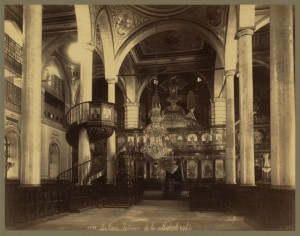 (The following is a guest post by Patricio Padua of the Library’s Collections and Services Division, h/t to Bryan Cornell in the Recorded Sound Reading Room.)
(The following is a guest post by Patricio Padua of the Library’s Collections and Services Division, h/t to Bryan Cornell in the Recorded Sound Reading Room.)
Some years ago, a monk decked in an elegant black robe visited the Recorded Sound Reading Room in search of the music of his elders: Coptic Chant, which comes out of an Orthodox Christian tradition in the Middle East. Who knows how far he had travelled to revisit this ancient music? But today, this monk or anyone else can listen to these sacred airs from a secluded monastery, or from their laptop at the corner café. A wealth of Coptic material is housed at the Library of Congress, and the Music Division is proud to be making it available for scholars and virtual travelers in Coptic Orthodox Liturgical Chant & Hymnody, The Ragheb Moftah Collection at the Library of Congress.
The word Coptic comes from the ancient Egyptian ha-ka-ptah, meaning “house of Ptah’s spirit.” Ptah was the god of Memphis, the ancient capital of Egypt. But as Coptic scholar Carolyn Ramzy notes, “the blues did sound just a little different during the Pharaonic age.” How fitting that this venerable musical tradition should share a name with a city that became the wellspring of a very different American musical heritage. Ramzy worked with the Performing Arts Encyclopedia team and made some surprising discoveries in the Library’s collections, including a Coptic music transcription dating back to 1643, and 17th-century maps of Coptic Christian sites.
The Coptic community has fascinated explorers, missionaries and scholars for centuries. Besides the many extant historical artifacts, Coptic liturgical chant was, and still is, regarded as the last living testament of an Ancient Egyptian art.
(Image of Coptic cathedral from the Prints and Photographs Online Catalog.)
